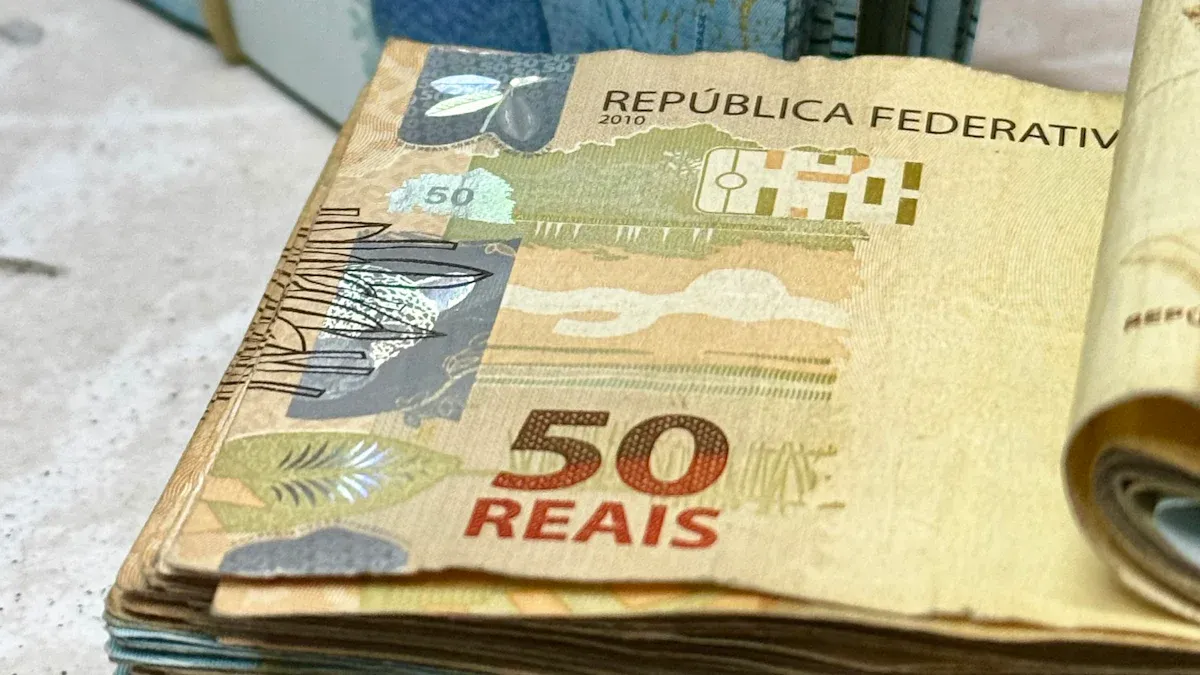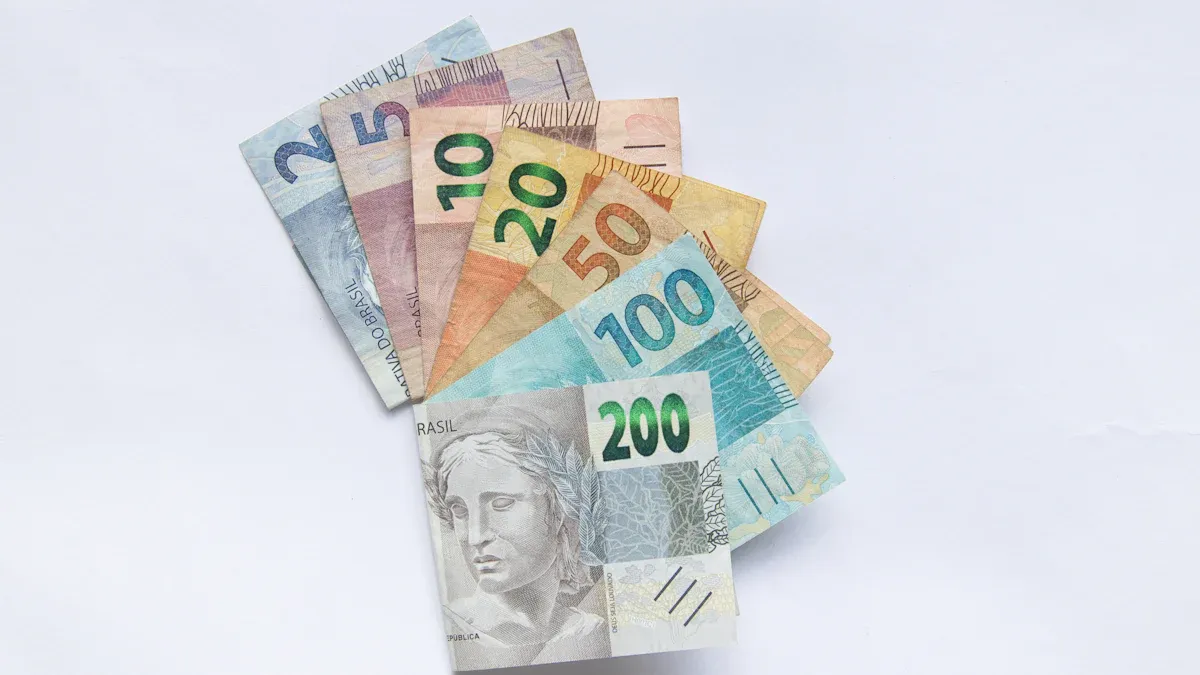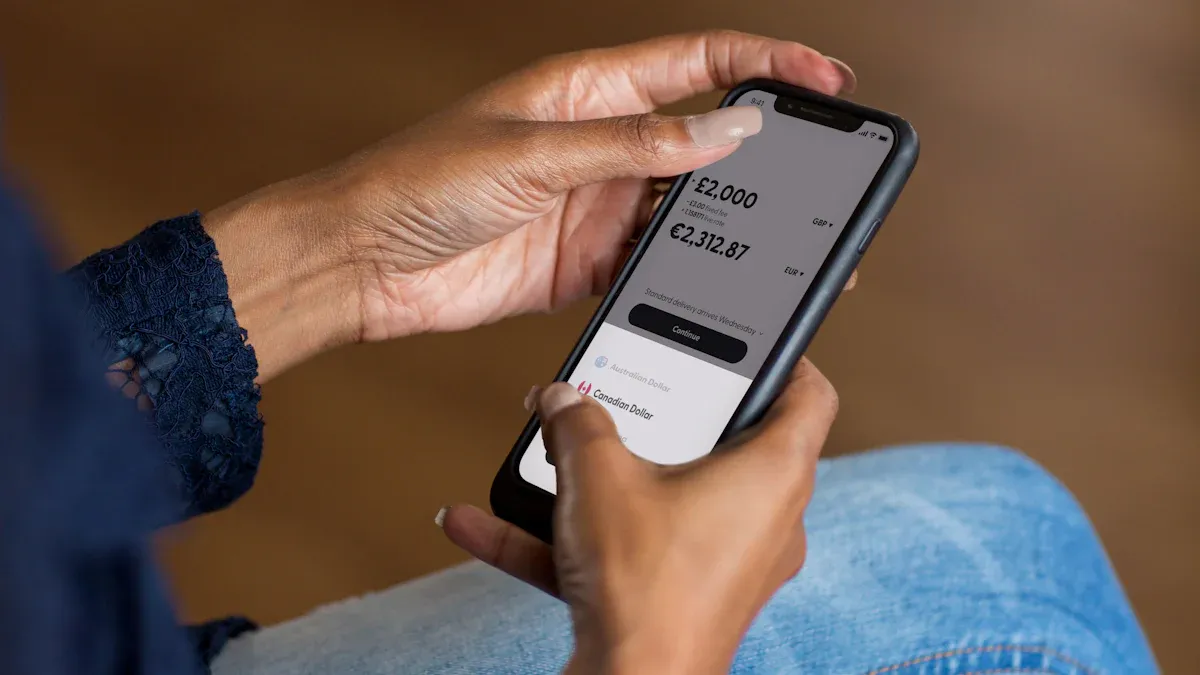- EasyCard
- Trade
- Help
- Announcement
- Academy
- SWIFT Code
- Iban Number
- Referral
- Customer Service
- Blog
- Creator
How to Understand the Brazilian Real, Its Remittance Methods and Advantages

Image Source: pexels
This article aims to help you make informed remittance decisions. You will gain a comprehensive understanding of the Brazilian Real and clearly compare various mainstream remittance methods.
This is a practical action guide. You can easily choose the most ideal remittance solution based on your specific requirements for cost, speed, and security.
Key Highlights
- The Brazilian currency is the Real, symbolized by R$, with the international code BRL.
- Brazil has strict foreign exchange regulations; all incoming foreign funds must be converted to Real to be usable.
- Online remittance platforms typically offer low fees and fast speeds, making them a great choice for sending money to Brazil.
- Traditional bank wire transfers are secure and reliable but come with high fees and slow speeds.
- When remitting to Brazil, you must provide the recipient’s CPF (individual tax ID) or CNPJ (company tax ID).
Part 1: Understanding the Brazilian Real (BRL)

Image Source: pexels
Before sending money to Brazil, you first need to understand the local currency. This will help you better time your remittance and understand the situation once funds arrive.
1.1 Currency Symbol, Denominations, and Units
The official currency symbol of the Brazilian Real is R$, and its international standard code is BRL. Understanding its denomination structure will help you grasp how your remittance amount translates into local value in Brazil.
- Banknote Denominations: The circulating banknotes mainly include 2, 5, 10, 20, 50, 100, and 200 Reais.
- Coin Denominations: Coins include 1 Real and 5, 10, 25, 50 “Centavos”. 100 Centavos equal 1 Real.
1.2 Key Factors Affecting Exchange Rates
The exchange rate of the Brazilian Real is floating and primarily influenced by two major factors:
- Interest Rate Differentials: The interest rate policy of the Central Bank of Brazil (BCB) is critical. For example, when the BCB cuts rates while the US Federal Reserve maintains rates, a narrowing interest rate differential may lead to depreciation of the Brazilian Real.
- Commodity Prices: Brazil is a major exporter of commodities such as iron ore and soybeans. When global prices of these commodities fall, Brazil’s export revenue decreases, potentially exerting downward pressure on the Real’s exchange rate.
1.3 Brazil’s Foreign Exchange Control Policies
This is one of the most important rules you must understand when remitting money. Brazil enforces strict foreign exchange controls, and all foreign funds entering Brazil must be registered and converted through official channels.
Key Point: Any foreign currency (such as USD) remitted to Brazil must be mandatorily converted to Brazilian Real (BRL) to be usable locally. The Real is the only legal tender for transactions within Brazil.
This means your recipient cannot directly hold or use the USD you send. All fund flows must be processed through financial institutions authorized by the Central Bank of Brazil and comply with anti-money laundering (AML) and counter-terrorism financing (CFT) regulations to ensure transaction legitimacy.
Part 2: Comparison of Mainstream Remittance Methods

Image Source: unsplash
Understanding different remittance channels is key to making an informed choice. Each method differs significantly in cost, speed, and process. Below, we provide a detailed comparison of three mainstream remittance methods.
2.1 Traditional Bank Wire Transfer
International wire transfer through a bank is the most traditional method. You can usually handle it at a bank branch or via online banking.
Its biggest advantage is security and reliability. The banking system has a mature compliance and security framework, especially suitable for large transactions, giving you full confidence.
However, you also need to be aware of its obvious drawbacks:
- High Costs: Bank wire transfers typically involve multiple fees, including remittance service fees and possible intermediary bank fees. The exchange rate is usually not the most favorable.
- Slower Speed: International wire transfer processing time may take 1 to 5 business days, or even longer. If holidays are involved or multiple intermediary banks are required, arrival time will be further delayed.
- Complex Process: You need to prepare and accurately fill in a large amount of recipient information.
Reference: Bank Wire Transfer Fees and Required Information
Taking major US banks as an example, their fee structure can serve as a reference. Note that other banks or financial institutions may charge additional fees.
Fee Example (Sending $1,000 USD)
Bank Transfer Type Fee (USD) Chase Online USD International Transfer $40 Chase Foreign Currency Wire to Non-US Bank Account $5
2.2 Online Remittance Platforms
In recent years, online remittance platforms like Wise, Remitly, and WorldRemit have become increasingly popular. They focus on providing more efficient and cost-effective international remittance services.
The core advantages of these platforms are:
- Transparent and Lower Costs: Many platforms (such as Wise) use the mid-market exchange rate and charge only a clear, low service fee with no hidden exchange rate markup.
- Extremely Fast Arrival: Most remittances can be completed within 24 hours, and some even arrive in minutes. For example, Wise data shows that over 90% of its remittances arrive within 24 hours.
- Highly Convenient Operation: You can complete all operations via a mobile app or website with a very user-friendly interface and real-time tracking functionality.
Core Advantage: Online remittance platforms offer the best balance of cost, speed, and convenience. They bypass the complex intermediary links of traditional banks through innovative technology, passing the savings back to you.
Although specific services vary slightly across platforms (for example, Ria Money Transfer has a vast cash pickup network, while Panda Remit has advantages in Asia), their common goal is to make your international remittance experience as simple as sending an email.
2.3 Third-Party Payment Tools
Third-party payment tools represented by PayPal are widely used globally for small commodity transactions and personal transfers.
Its main advantages are convenience and broad coverage. If both parties have PayPal accounts, transfers are nearly instant, making it ideal for paying service fees or sending small amounts to friends.
However, when using it to remit to Brazil, you must be cautious of its high hidden costs:
- Complex Fee Structure: Fees typically include a fixed service fee, a percentage-based service fee, and possible credit card processing fees.
- Significant Exchange Rate Loss: PayPal adds a substantial markup to the wholesale exchange rate during currency conversion. This “currency conversion fee” can be as high as 4%, meaning your recipient receives far less than they would with the mid-market rate.
Beware of Hidden Costs: PayPal Example
Suppose you send $500 USD to a friend in Brazil via PayPal; the fees might look like this:
Scenario Typical Fee Currency Conversion Fee Personal Payment (via Bank Account) 5% (max $4.99) May apply 4% conversion fee Personal Payment (via Credit Card) 5% (max $4.99) + 2.9% + fixed fee May apply 4% conversion fee This means, in addition to visible service fees, you’ll lose a significant amount on the exchange rate. Therefore, PayPal is better suited for convenient instant small payments rather than cost-saving regular remittances.
Part 3: How to Choose the Best Remittance Solution
Now that you understand the different remittance channels, the next step is to choose based on your personal needs. This section directly compares the performance of different methods in cost, speed, convenience, and security, providing clear decision-making guidance.
3.1 Cost Considerations: How to Save on Fees
For most people, cost is the primary consideration when remitting money. How do you ensure your recipient receives as much as possible?
Conclusion: Online remittance platforms are usually the most cost-effective.
- Online Remittance Platforms (Wise, Remitly, etc.): Their core advantage lies in transparent fee structures and highly competitive exchange rates. Many platforms use the mid-market rate and charge only a small, fixed service fee. This means you won’t lose significant funds due to poor exchange rates.
- Traditional Bank Wire Transfer: Banks have the highest costs. You not only pay high service fees but may also face intermediary bank charges. More importantly, bank-provided exchange rates typically include substantial markups, a hidden cost.
- Third-Party Payment Tools (PayPal): Despite convenience, PayPal charges up to 4% “currency conversion fee” during exchange, far exceeding its visible service fees. Thus, it’s not suitable for cost-saving remittances.
Data Comparison: Sending $1,000 USD to Brazil
The table below shows the competitiveness of different online platforms in exchange rates. Note that fees and rates fluctuate in real time, but this comparison clearly demonstrates the advantage of online platforms.
Service Name Exchange Rate Fee (USD) Recipient Amount (BRL) Wise 5.4044 $3.88 5,404.40 Instarem 5.4044 $3.88 5,404.40 Currencies Direct 5.4039 $0 5,403.90 Xe 5.3232 $0 5,323.25 As shown, choosing a platform with a better exchange rate can result in your recipient receiving hundreds more Reais.
3.2 Speed Considerations: Which Method Is Fastest
If you urgently need funds to reach the recipient, speed becomes critical.
Conclusion: Online remittance platforms are the fastest, with some services offering near-instant arrival.
- Online Remittance Platforms: Many platforms (such as Taptap Send, Sendwave, Western Union App) offer arrival within minutes, with funds directly deposited into the recipient’s bank account or mobile wallet. Most standard transfers complete within 24 hours.
- Third-Party Payment Tools: PayPal transfers between accounts are instant, but withdrawing funds from a PayPal account to a Brazilian bank account requires additional time.
- Traditional Bank Wire Transfer: This is the slowest method. A wire transfer typically takes 2-5 business days to arrive.
Bank Wire Transfer Time Example
Deposit Confirmation Time (EST) Funds Arrival Time (Brazilian Bank Account) Before 09:00 AM Within 2 business days After 10:00 AM Within 3 business days Note that weekends and public holidays further extend processing time. For example, a request submitted after 10 AM on Friday may not arrive until the following Wednesday.
Caution: Common Factors Affecting Remittance Speed
- Compliance Review: To comply with anti-money laundering (AML) regulations, banks or platforms may require manual review of your transaction, especially for large or frequent remittances.
- Information Errors: Any minor spelling error in the recipient’s name, account number, or CPF/CNPJ can cause the transaction to be paused or even rejected.
- Holidays and Time Zones: Public holidays in Brazil or the sending country, weekends, and bank cutoff times can cause delays.
- Intermediary Banks: Traditional wire transfers usually pass through one or more intermediary banks, each adding processing time.
3.3 Convenience Considerations: Simplifying the Process
A smooth, simple process saves you significant time and effort.
Conclusion: Mobile apps of online platforms provide the best convenience.
Consumer reports indicate that mobile apps have become essential tools for managing finances. You can complete remittances anytime, anywhere via your phone, with an experience far superior to traditional online banking or bank counters.
The operation process of online remittance platforms is usually very simple:
- Select the destination country (Brazil) and remittance amount on the app or website.
- Choose the receiving method, such as bank deposit or Pix.
- Enter the recipient’s information (name, bank account, CPF/CNPJ, etc.).
- Select your payment method (such as bank account, debit card, or credit card) and complete payment.
Practical Checklist: Core Information Needed for Remittance to Brazil
Regardless of the method you choose, preparing the following information will make the process smoother:
- Recipient’s Full Name (must exactly match the bank account name)
- Recipient Tax ID: CPF (11 digits) for individuals, CNPJ (14 digits) for companies. This is mandatory information.
- Bank account number, branch code, and bank code.
- Recipient’s address and phone number.
In contrast, bank wire transfers may require you to visit a branch in person, queue, and fill out complex forms.
3.4 Security Considerations: Choices for Large Remittances
When handling large amounts, security is non-negotiable.
Conclusion: Compliant online platforms provide the same high-level security as traditional banks for large remittances.
Many people instinctively believe banks are the safest, which was true in the past. But today, the landscape has changed.
- Traditional Banks: With their long history and strict regulatory systems, banks still inspire strong trust when handling very large amounts (e.g., hundreds of thousands of USD).
- Online Remittance Platforms: Benefiting from modern technology and strict financial regulation, compliant online platforms are equally secure.
- Regulatory Compliance: According to Brazilian government regulations, all digital remittance providers operating in Brazil must be registered and comply with strict anti-money laundering (AML) and know-your-customer (KYC) regulations.
- Technical Security: They employ bank-grade security technologies, such as SSL/TLS encryption to protect data transmission, multi-factor authentication (MFA) to prevent account theft, and tokenization to safeguard your payment information.
- High Limit Support: Many platforms have very high transfer limits. For example, Wise’s single wire transfer limit can reach $1,000,000 USD, far exceeding many banks’ online transfer limits. In contrast, some US banks’ personal online transfer limits may be only $1,000 USD per transaction.
Therefore, when sending large funds, a fully regulated online platform with a good reputation is equally trustworthy and more cost-effective.
The key to choosing the best remittance solution lies in balancing your needs for cost, speed, and convenience.
For most daily remittances, online platforms offer the best overall experience. If your remittance amount is extremely large or has special security requirements, traditional banks remain a reliable choice.
Action Recommendation: Before each remittance, spend a few minutes using tools like Wise or Xe to compare real-time exchange rates. You can also set rate alerts to complete the transfer at the optimal time, ensuring every penny is well spent.
FAQ
Is it mandatory to provide CPF or CNPJ when remitting to Brazil?
Yes, it is mandatory. CPF is Brazil’s individual tax ID, and CNPJ is the company tax ID. According to the Central Bank of Brazil, all incoming remittances must register the recipient’s tax information to ensure transaction legitimacy and compliance.
If I only need to send a small urgent amount, which method is best?
Online remittance platforms are your ideal choice. Many platforms offer near-instant arrival, with a simple process and total costs typically far lower than PayPal or traditional banks. You can complete all steps quickly via a mobile app.
How can I avoid paying hidden remittance fees?
You should prioritize platforms that use the mid-market exchange rate and clearly display service fees. Before confirming the remittance, always compare the “final amount received” across channels, not just the visible service fees. This helps you effectively avoid exchange rate losses.
Can my recipient receive USD directly in Brazil?
No, they cannot. Brazil enforces strict foreign exchange control policies. All foreign currency (such as USD) remitted to Brazil must be mandatorily converted to Brazilian Real (BRL) before the recipient can use it. The Real is the only circulating currency within Brazil.
Through this in-depth analysis of the Brazilian Real (BRL) and comparisons of mainstream remittance methods, we’ve uncovered its exchange rate sensitivities to interest rate differentials and commodity prices, alongside mandatory forex conversion rules, effectively addressing remitter challenges like rate losses, steep intermediary fees, and cumbersome info prep—particularly for family support or business settlements to Brazil. However, for remittances spanning global multi-currency needs, digital asset integration, or lower-barrier instant swaps, a unified digital platform enhances your cross-border flow, dodging traditional channels’ 1-5 day delays and 4% rate markups. BiyaPay, the expert global payment solution, offers real-time exchange rate queries and conversions for over 30 fiat currencies and 200+ cryptocurrencies, securing optimal rates like the current USD/BRL around 5.40 without any hidden costs.
Simply register for effortless access to remittance fees as low as 0.5%, reaching most countries worldwide with same-day arrivals. This outshines online platforms’ limits and banks’ intricate reviews, fortified by multi-layer encryption and AML/KYC compliance for secure large-sum flows. Whether tackling Brazil’s CPF/CNPJ registration or sudden rate swings, BiyaPay’s transparency maximizes your fund value and eases multi-platform hassles.
Act now! Hit the real-time exchange rate query to track BRL live and launch your free account. Embrace BiyaPay for a seamless, dependable international remittance adventure, where every BRL transfer is precise and potent.
*This article is provided for general information purposes and does not constitute legal, tax or other professional advice from BiyaPay or its subsidiaries and its affiliates, and it is not intended as a substitute for obtaining advice from a financial advisor or any other professional.
We make no representations, warranties or warranties, express or implied, as to the accuracy, completeness or timeliness of the contents of this publication.




Contact Us
Company and Team
BiyaPay Products
Customer Services
is a broker-dealer registered with the U.S. Securities and Exchange Commission (SEC) (No.: 802-127417), member of the Financial Industry Regulatory Authority (FINRA) (CRD: 325027), member of the Securities Investor Protection Corporation (SIPC), and regulated by FINRA and SEC.
registered with the US Financial Crimes Enforcement Network (FinCEN), as a Money Services Business (MSB), registration number: 31000218637349, and regulated by FinCEN.
registered as Financial Service Provider (FSP number: FSP1007221) in New Zealand, and is a member of the Financial Dispute Resolution Scheme, a New Zealand independent dispute resolution service provider.



















